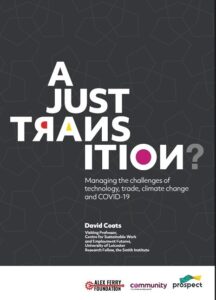A Just Transition? Managing the Challenges of Technology, Trade, Climate Change and COVID-19
A report released today warned that a combination of Covid-19, globalisation, technological and climate change is creating a “slow-motion traffic accident” for jobs and living standards with social and economic disaster imminent in industrial towns across the United Kingdom without government intervention. It also laid out a series of previous failures made in these towns such as following the closure of a steelworks in 2015 that left 4,000 workers unemployed.
The report – entitled ‘A Just Transition? Managing the challenges of technology, trade, climate change and COVID-19’ – explored how these transitions in industrial towns can be managed. The report looked at how industrial change has been handled in two sectors – coal fired electricity generation and steel making.
The report studied the closure of SSI steelworks in Redcar in 2015. It highlighted that Government response to steelwork closures that left thousands made redundant “showed limited preparedness” and demonstrated an “absence of learning from earlier experiences”. Most troublingly, it showed that the impact of steel plant closures on local communities “did not inspire a wider discussion” at either national or local government level. More than four in five of the former steelworkers interviewed described government support as “inadequate”.
Alasdair McDiarmid, Operations Director at Community, says:
“The current pace of change is unprecedented, with huge implications for our economy, jobs and industrial communities. The formidable contemporary challenges of climate change, automation, Brexit and COVID-19, combined with the more familiar impacts of recession and globalisation, demand a national conversation about the management of industrial change.
We need only look to SSI in Redcar as an example of what can happen when a strategic business and major employer is allowed simply to collapse. The devastation from the closure was huge and its impacts continue to be felt throughout the community. Testimony from SSI steelworkers included heart-rending stories of desperate searches for work, relationship breakdowns, increased mental health issues and the loss of family homes. Only two thirds were able to find new full-time work, and 18% of laid-off workers took two years to get a new job.
SSI was an avoidable tragedy that must never be repeated. We must heed the warnings of this report and act to ensure that in future industrial transitions the interests of people and communities are properly represented.”
Keiran Goddard of The Alex Ferry Foundation, says:
“There is a golden thread that runs through this report… the extent to which an industrial transition is “Just” is not a question of destiny but a question of contestation, ideology, strategy and solidarity. As a Foundation committed to increased access to good work, both today and in the future, we are proud to support this work, which makes an invaluable contribution to one of the most important economic and social debates of our time”
Sue Ferns, Senior Deputy General Secretary at Prospect, says:
“The drive for Net Zero clearly presents huge opportunities for jobs and industry, as well as for our climate, but there are also challenges that must be negotiated if we are to ensure that the journey to a clean economy is one that all workers can share in.
In the past the UK has had a patchy record of managing industrial change, often because of a lack of dialogue and a sense of shared endeavour between government, employers, and workers. Helping the workforce to transition from high to low carbon jobs is absolutely essential if we are to maintain public support for Net Zero and harness a sense of national mission as we prepare to host the world at COP26.
To that end government should establish a UK Just Transition taskforce to bring together unions, businesses and government in a space where these challenges can be tackled head on.”
The report recommends that the government establish a commission tasked with managing change in industrial towns. The commission would be responsible for monitoring the full range of government policies around industrial change – notably, industrial policy, regional policy, labour market policy, skills policy and the industrial relations architecture. The report further recommends sector forums to manage industrial transitions as well as increased devolution and more robust industrial relations policies.
The advisory committee for the report consists of Community, Prospect and The Alex Ferry Foundation. The report was prepared by Dr David Coats, Visiting Professor at the University of Leicester and Research Fellow at the Smith Institute.
Click the image below to read the full report




